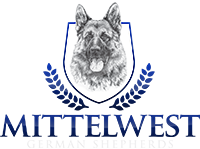Selecting the right German Shepherd puppy involves more than finding one with the most adorable face. Understanding their pedigree—a lineage record with details on health, temperament, and traits—is key to making an informed decision. With the proper knowledge, you can ensure your new companion fits your home and lifestyle perfectly.
The pedigree evaluation may seem intimidating for those searching for a German Shepherd puppy. In this article, learn how to decode a pedigree, what traits to prioritize, and why it matters in your decision-making process. See how health clearances, lineage, and temperament play a role in ensuring you choose a well-bred, loyal companion.

Understanding The Basics Of A German Shepherd’s Pedigree
A pedigree records a dog’s lineage, highlighting health, achievements, and traits passed through generations. For a breed as celebrated as the German Shepherd, this offers an invaluable window into a puppy’s background and potential. This information can help you predict whether your companion will meet your needs and expectations.
Pedigree papers include abbreviations and symbols that require some effort to interpret effectively. These notations summarize a puppy’s ancestors’ health, achievements, and working abilities. Common notations include:
- HD (Hip Dysplasia) and ED (Elbow Dysplasia): Ratings that show joint health evaluations.
- SCHH (Schutzhund): A working title from Schutzhund training covering tracking, obedience, and protection.
- IPO (Internationale Prüfungs-Ordnung)/IGP (Internationale Gebrauchshund Pruefung): Modern titles for working trials focused on discipline and problem-solving abilities.
A reputable breeder will gladly explain the pedigree’s details to help you make an informed decision. Understanding these elements ensures you can confidently evaluate a German Shepherd’s potential and select the one that best suits your needs. Understanding the key aspects of a puppy’s heritage is significant in making an informed choice.
Spotting Key Components In A Puppy’s Heritage
Understanding a German Shepherd’s heritage is necessary when selecting the right companion. Each aspect of a dog’s lineage contributes to its health, temperament, and abilities. Focusing on specific components gives you a clearer picture of the qualities your pet is likely to inherit.
Health Clearances & Genetic Testing
One of the most important aspects of a pedigree is the inclusion of health clearances for hereditary conditions. German Shepherds are known to be prone to health issues, such as hip dysplasia, degenerative myelopathy, and heart conditions. Pedigree documents indicate whether the lineage’s ancestors cleared these problems.
Healthy dogs with proper clearances are less likely to pass on genetic conditions. For instance, breeding pairs with excellent joint health scores produce puppies with strong hips. Comprehensive genetic testing further reduces the risk of inheriting diseases like degenerative myelopathy, a progressive spinal cord disorder.
A strong pedigree shows health testing records from organizations like the Orthopedic Foundation for Animals (OFA) or similar international bodies. These certifications verify that breeders screened the lineage for common genetic conditions. Prioritizing such records ensures your puppy comes from a responsible, health-focused breeding background.
Titles & Achievements
German Shepherds are a versatile breed with the ability to excel in various roles, including service work, competitive sports, and protection. Pedigree documents often highlight the titles and achievements of a German Shepherd’s ancestors, which can provide insight into their abilities and temperament. Here are some examples:
- VA (Excellent Select): Given to dogs excelling in top-tier conformation shows, showcasing exceptional physical structure and adherence to breed standards.
- V (Excellent): A prestigious rating for dogs demonstrating outstanding conformation quality.
- IPO or IGP Titles: Recognize excellence in working trials that evaluate tracking, obedience, and protection work skills.
These titles reflect the quality of the breeding process and the lineage’s adherence to breed standards. They demonstrate the breeder’s focus on producing dogs with exceptional physical traits and strong mental abilities. Such recognition underscores the balanced qualities passed down through the puppy’s ancestry.
Lineage & Ancestry
Another critical element of a pedigree is the detailed record of ancestry. A good pedigree will list at least three to four generations of ancestors, often with notes about their health, achievements, and traits. Patterns can emerge when analyzing this data. For instance, a consistent history of dogs with strong health is a promising sign.
Additionally, some breeders focus on specific bloodlines, such as West German Show Lines or Working Lines, which may influence the puppy’s characteristics. Understanding the significance of these bloodlines can help you make an informed choice based on your needs.
A German Shepherd’s heritage offers more than insight into achievements and skills. It also hints at inherited qualities that influence a dog’s development. Among these, physical characteristics play a noticeable role in shaping the traits of each generation.
Evaluating Physical Traits Through Pedigree
Evaluating physical traits through a German Shepherd’s lineage offers insight into its potential development. German Shepherds display an athletic build, upright ears, and distinct coat patterns that define their noble and functional appearance. By reviewing a puppy’s heritage, you can anticipate many of these traits as they mature.
Breed standards from organizations like the American Kennel Club (AKC) set clear expectations for German Shepherds. These guidelines outline ideal height, weight, and proportions. Puppies descending from dogs meeting these standards are more likely to develop the classic look associated with the breed.
The coat of a German Shepherd is one of its most striking features and adds to its appearance and functionality. Generations of careful breeding influence both coat type and color, offering clues about the dog’s lineage. Coat types and colors in German Shepherds vary widely, with options including:
- Black and tan.
- Sable.
- Solid black.
- Bi-color.
Pedigree records can reveal what coat colors or lengths a puppy may inherit, from short to long-haired. These traits influence grooming needs and suitability to different climates. While appearance may not be every owner’s priority, understanding these aspects helps you better prepare for your new companion.
Assessing Temperament & Behavioral Traits
Assessing temperament is vital when selecting a German Shepherd, as personality impacts how well the dog fits into your life. Known for their intelligence, loyalty, and adaptability, these dogs can excel as family companions or working partners. However, temperament often varies based on the lineage and breeding practices behind the puppy.
A pedigree helps predict temperament by showcasing traits passed down through generations. Dogs with working titles often inherit focus, resilience, and trainability, making them ideal for tasks requiring discipline. On the other hand, lineages with family-oriented dogs tend to pass down calmer, more dependable traits suited for households.
Studying a German Shepherd’s ancestry ensures its temperament aligns with your needs. Whether you want a high-energy working partner or a relaxed family companion, the pedigree offers valuable clues. Breeders use this tool to pair traits that complement specific purposes, providing a reliable guide for predicting behavior.
Ensuring Quality Through Trusted Breeders
The breeder plays a central role in ensuring the quality and transparency of a German Shepherd’s lineage. A responsible professional carefully records the dog’s ancestry and selects pairs, prioritizing health, temperament, and adherence to breed standards. When evaluating your options, consider asking about:
- Pedigree Documentation: Review the lineage for multiple generations, including achievements and titles.
- Health Clearances: Confirm screenings for conditions like hip and elbow dysplasia and genetic testing for hereditary diseases.
- Lineage Traits: Understand which characteristics, such as temperament or working ability, were emphasized in breeding decisions.
- Adherence to Standards: Check if the parents meet established breed standards for physical and behavioral qualities.
- Breeding Philosophy: Learn about the breeder’s approach to pairing dogs and their goals for improving the breed.
Trusted breeders value transparency and are open to discussing every aspect of a puppy’s background. Their willingness to provide detailed answers reflects their commitment to maintaining high standards. Partnering with a breeder who values health and integrity builds the foundation for a lasting bond with your new companion.
Partnering With Mittelwest For Quality Companions

A well-documented pedigree lays the foundation for a healthy, balanced, and reliable German Shepherd. At Mittelwest, we take pride in providing German Shepherds with pedigrees that reflect generations of thoughtful breeding. These records showcase our dogs’ lineage, achievements, and health testing, ensuring you clearly understand your puppy’s heritage.
We know how momentous it is to find a companion that fits your lifestyle and goals. Whether you’re searching for a family dog, a working partner, or a show-quality German Shepherd, we work closely to find the right match. Our commitment doesn’t stop at providing healthy puppies; we’re here to guide you every step of the way.
Our German Shepherds come from champion bloodlines with proven health, temperament, and structure. These traits are carefully selected and cultivated to uphold the breed’s highest standards. Focusing on quality over quantity ensures that every puppy receives the attention and care it deserves when born.
We’re partners in helping you bring home a loyal, loving German Shepherd. If you have questions about pedigrees, training, or care, our team is here to provide answers. Let us help you find a lifelong companion you and your family can cherish for years.
A German Shepherd puppy’s pedigree holds critical details about its health, temperament, and potential traits. Examining health clearances, titles, and lineage helps ensure the puppy meets your expectations. A well-maintained pedigree also reflects careful breeding practices to preserve and enhance the breed.
Careful evaluation of a puppy’s heritage and choosing a breeder focused on transparency and quality are critical steps in finding the right companion. For a trusted source, consider Mittelwest German Shepherds and their commitment to excellence.













